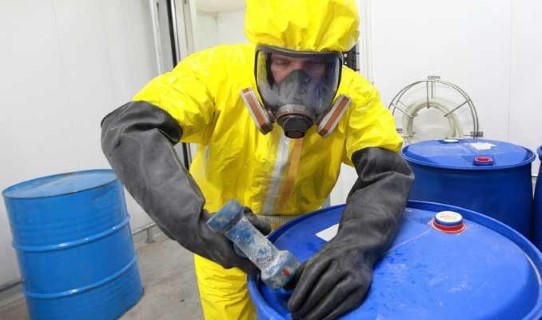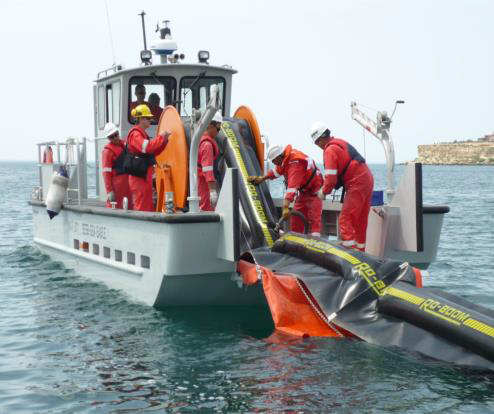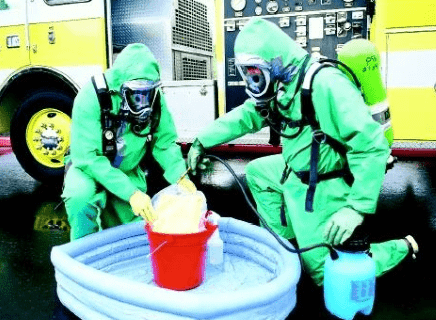COURSE OVERVIEW
HE0115 : Emergency Spill Response of Hazardous Chemicals (OSHA & NFPA Standards)

OVERVIEW
| COURSE TITLE | : | HE0115 : Emergency Spill Response of Hazardous Chemicals (OSHA & NFPA Standards) |
| COURSE DATE | : | Feb 02 - Feb 06 2025 |
| DURATION | : | 5 Days |
| INSTRUCTOR | : | Mr. John Taljard |
| VENUE | : | Istanbul, Turkey |
| COURSE FEE | : | $ 6000 |
| Request For Course Outline | ||
Course Description
Emergency responders are those people who may be the first emergency personnel to arrive at hazardous material/waste incidents and are expected to take some evasive actions to protect the people or the environment. Most emergency responders are limited in their ability to perform aggressive actions due to lack of knowledge or training and lack of resources. Emergency response personnel must understand the Regularity Information & Rules and how to stay within the boundaries delimited by these Rules. These rules include OSHA, 29 CFR, Part 1910.120, “Hazardous Waste Operation and Emergency Response” and NFPA 472 “Standard for Professional Competence of Responders to Hazardous Materials Incidents”.
A chemical spill incident is unlike other types of incidents in which emergency response personnel may be involved. Time is not as critical as at other incidents. Common sense must be applied at all times. Each incident response must be organized to develop a total plan of operation, including options to be exercised in the event of scene deterioration. Monitoring of clean-up contractors requires basic knowledge of procedures and regulatory aspects to ensure that safe and professional clean-up activities are conducted.
Many responses by emergency service organizations have been conducted in a “shooting from the hip” mode. Emergency response personnel are learning by their mistakes, but those mistakes can be very costly.
This course is designed to cover incidents involving the common, everyday hazards that can be encountered in any industry at any time. The chemicals involved in these incidents may not be exotic, but they are equally deadly. The result of exposures to hazardous chemicals (both acute and chronic) will be detailed. The course will develop a clear understanding of the “limitations” of emergency responders at chemical incidents and also how these responders can function to their maximum ability within those limitations.
Further, the course will develop an appreciation among emergency response personnel that scene control cannot be effective with only incomplete facts about the material and conditions involved. To achieve a favourable outcome, emergency response personnel must gather all pertinent information on the situation, evaluate that information using a multi-phase process and implement a plan in an organized safety-oriented program.
link to course overview PDF
A chemical spill incident is unlike other types of incidents in which emergency response personnel may be involved. Time is not as critical as at other incidents. Common sense must be applied at all times. Each incident response must be organized to develop a total plan of operation, including options to be exercised in the event of scene deterioration. Monitoring of clean-up contractors requires basic knowledge of procedures and regulatory aspects to ensure that safe and professional clean-up activities are conducted.
Many responses by emergency service organizations have been conducted in a “shooting from the hip” mode. Emergency response personnel are learning by their mistakes, but those mistakes can be very costly.
This course is designed to cover incidents involving the common, everyday hazards that can be encountered in any industry at any time. The chemicals involved in these incidents may not be exotic, but they are equally deadly. The result of exposures to hazardous chemicals (both acute and chronic) will be detailed. The course will develop a clear understanding of the “limitations” of emergency responders at chemical incidents and also how these responders can function to their maximum ability within those limitations.
Further, the course will develop an appreciation among emergency response personnel that scene control cannot be effective with only incomplete facts about the material and conditions involved. To achieve a favourable outcome, emergency response personnel must gather all pertinent information on the situation, evaluate that information using a multi-phase process and implement a plan in an organized safety-oriented program.
TRAINING METHODOLOGY
This interactive training course includes the following training methodologies:
LecturesWorkshops & Work Presentations
Case Studies & Practical Exercises
Videos, Software & Simulators
In an unlikely event, the course instructor may modify the above training methodology for technical reasons.
VIRTUAL TRAINING (IF APPLICABLE)
If this course is delivered online as a Virtual Training, the following limitations will be applicable:
| Certificates | : | Only soft copy certificates will be issued |
| Training Materials | : | Only soft copy materials will be issued |
| Training Methodology | : | 80% theory, 20% practical |
| Training Program | : | 4 hours per day, from 09:30 to 13:30 |
RELATED COURSES

HE0793 : Oil Spill Management & Response (IMO OPRC Level 1 & 3)
- Date: Feb 23 - Feb 27 / 3 Days
- Location: Al Khobar, KSA
- Course Details Register

HE0127 : Industrial Hygiene Certification Program W507: Health Effects of Hazardous Substances (Accredited by OHTA-BOHS)
- Date: Feb 23 - Feb 27 / 3 Days
- Location: Doha, Qatar
- Course Details Register

HE1944 : Industrial Hygiene Certification Program: BOHS-M200: Basic Principles in Occupational Hygiene (Accredited by the British Occupational Hygiene Society - BOHS)
- Date: Feb 23 - Feb 27 / 3 Days
- Location: Dubai, UAE
- Course Details Register

HE0254 : Industrial Hygiene Certification Program OHTA502: Thermal Environment (Accredited by OHTA)
- Date: Feb 23 - Feb 27 / 3 Days
- Location: Doha, Qatar
- Course Details Register
